Boiler Installation Old Brampton
Find the best New Boiler in Old Brampton
Get 3 FREE Boiler Installation quotes for your project today! Compare profiles, reviews, accreditations, portfolio, etc... and choose the best offer.

TitanFlameltd-Glossop
51 reviews175 High St W, Glossop, SK13 8HJ, GBTitan Flameltd is a local plumbing emergency call out service with over 20 years of experience in plumbing and heating. We strive to complete every job with the highest skill and best customer service. Our team of emergency plumbers and heating engineers are available 24/7 to provide fast, reliable solutions. We offer a range of services including appliance installation, bathroom plumbing, emergency plumbing, immersion heaters, kitchen plumbing, outdoor plumbing, tap repair and install, pipe repair, boiler installation and repair, water heater installation and repair, radiator installation and repair, gas line installation and repair, furnace installation and repair, heat pump installation and repair, drain cleaning, plumbing repairs, pipe installation and repair, water treatment, and sewer line repair and replacement. We are available 24/7 and offer quick appointments, fast, efficient services, and expert support when you need it most.
- Services
- Why Us?
- Gallery
Get Quote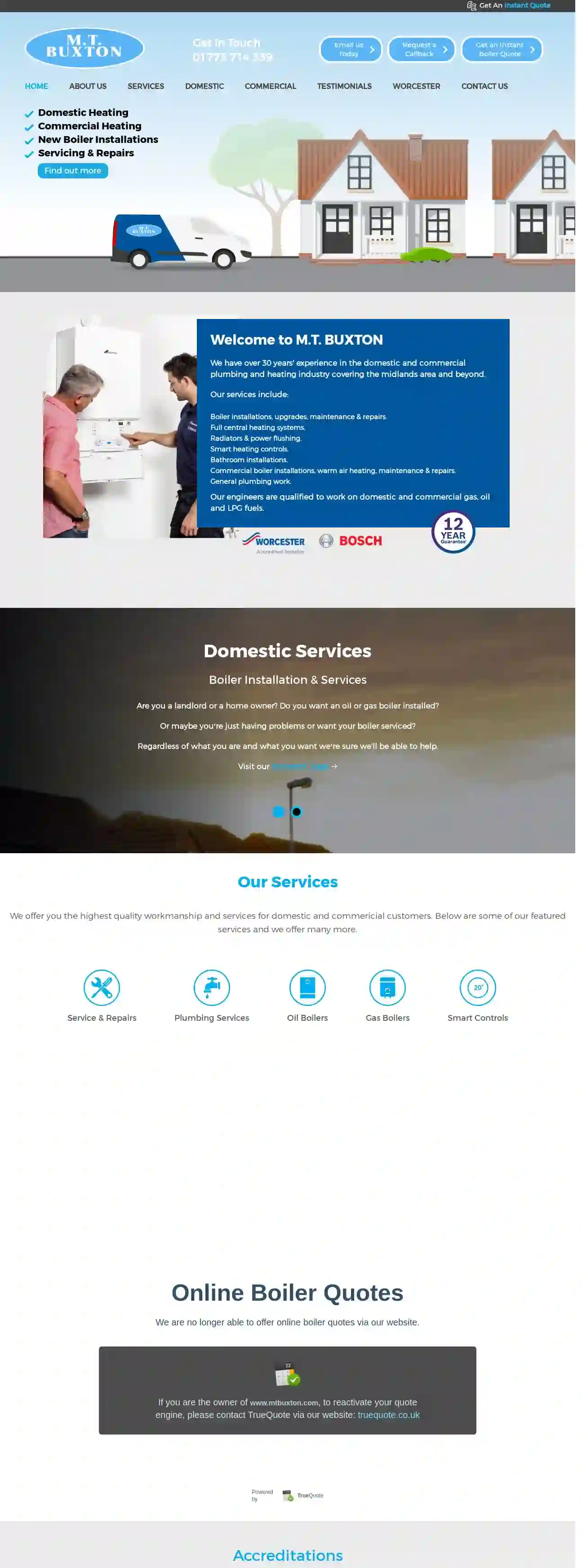
M T Buxton Plumbing & Heating
423 reviewsLangley Mill, 237-241 Station Road, Nottingham, NG16 4AD, GBM.T. Buxton Plumbing & Heating is a company with a structured management team which has a wealth of experience on a variety of domestic and commercial work. We have a solid client base reflecting the twenty four years the company has been in existence and as any reliable contractor we are always seeking to expand and develop. Our client list currently includes the Co-Operative Group, Sandicliffe Motors and Repton School to name just a few. We are confident and well able to meet the demands in providing both quality and competitive quotations for a wide spectrum of domestic and commercial work. We are adequately staffed to handle a wide range of contracts from domestic works up to the multi-disciplined service installations associated with larger projects. The company's Senior management, and the assigned contracts engineer, closely monitor the installations to maintain our high standard of workmanship, working closely with all of our directly employed labour force. Our company strategy pursues contracts throughout the UK which would include installation work, planned and reactive maintenance. We trust this proves of sufficient interest and we would welcome any enquires either by our contact page.
- Services
- Why Us?
- Accreditations
- Gallery
Get Quote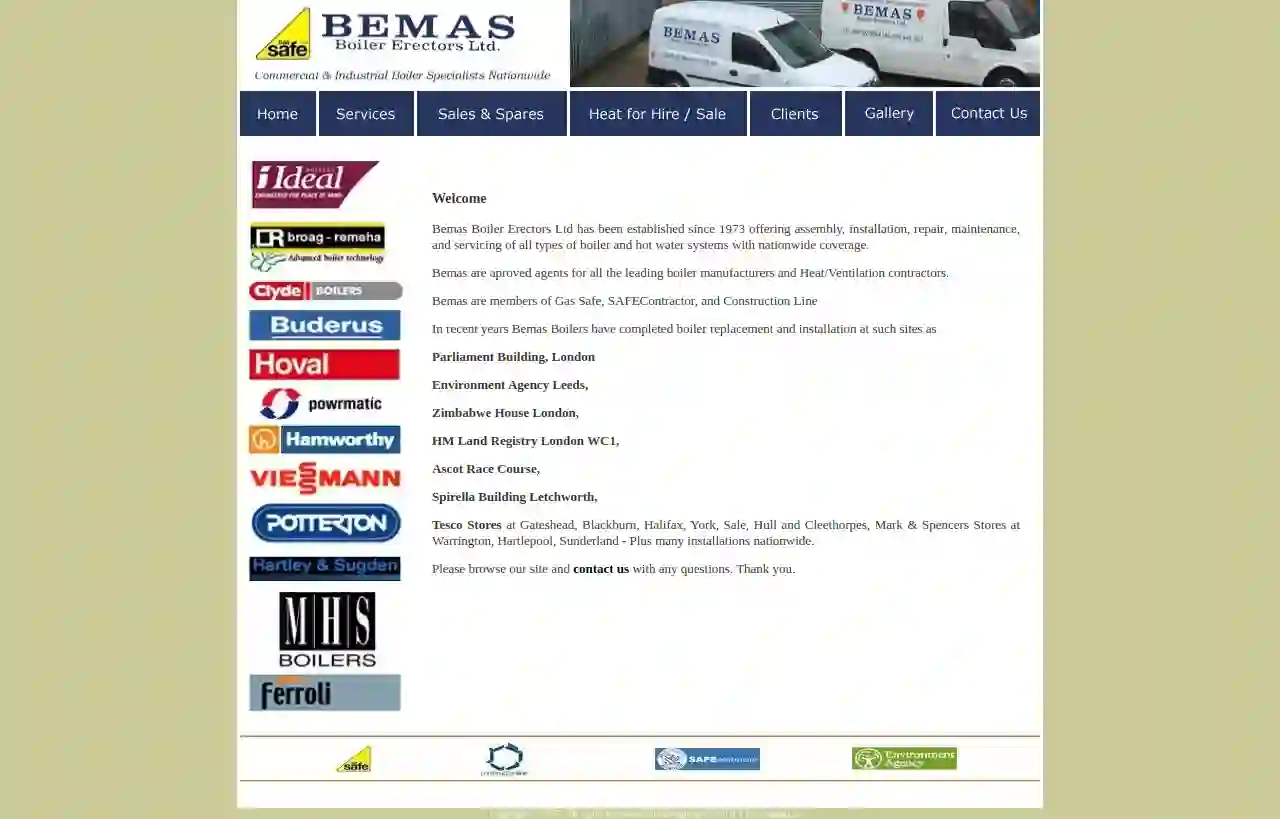
Bemas Boilers Ltd
Cilfton Avenue, Long Eaton, NG10 2GA, GBBemas Boiler Erectors Ltd has been established since 1973 offering assembly, installation, repair, maintenance, and servicing of all types of boiler and hot water systems with nationwide coverage. Bemas are approved agents for all the leading boiler manufacturers and Heat/Ventilation contractors. Bemas are members of Gas Safe, SAFEContractor, and Construction Line. In recent years Bemas Boilers have completed boiler replacement and installation at such sites as Parliament Building, London, Environment Agency Leeds, Zimbabwe House London, HM Land Registry London WC1, Ascot Race Course, Spirella Building Letchworth, Tesco Stores at Gateshead, Blackburn, Halifax, York, Sale, Hull and Cleethorpes, Mark & Spencers Stores at Warrington, Hartlepool, Sunderland - Plus many installations nationwide. Please browse our site and contact us with any questions. Thank you.
- Services
- Why Us?
- Gallery
Get Quote
Whitehead Plumbing And Heating
4.753 reviewsLong Eaton, GBWHITEHEAD PLUMBING AND HEATING is a fully gas safe registered, independent local company serving Long Eaton, Nottingham. We pride ourselves on providing high-quality work and exceptional customer service. Whether you need a new boiler installation, bathroom fitting services, or any other plumbing or heating repairs, our team of friendly and reliable professionals is here to help. We understand the importance of quality workmanship and customer satisfaction, ensuring you are completely happy with our services. Contact us today for all your heating and plumbing needs.
- Services
- Why Us?
- Accreditations
- Our Team
- Testimonials
- Gallery
Get Quote
Complete Cooling Services Ltd
524 reviewsUnit 4a, Huss's Lane, Long Eaton, NG10 1G, GBComplete Cooling Services is a local HVAC engineers company providing the best services for heating, ventilation & air conditioning. With over 107 years of combined industry experience and knowledge, our team of highly trained and skilled HVAC engineers deliver exceptional services. We provide a seamless and reliable service when it comes to your HVAC systems installation, maintenance and repairs. Our services include air conditioning installation, repairs, service & maintenance, planned preventative maintenance, and more. We are a local company dedicated to ensuring that all of our customers get the very best service and support when it comes to their air conditioning and comfort cooling requirements.
- Services
- Why Us?
- Our Team
- Gallery
Get Quote
GasCare
4.9539 reviewsGlossop, GBGasCare is a trusted partner for all your home heating needs. We offer a range of services, including boiler installation, repair, servicing, and smart heating solutions. Our team of experienced engineers is dedicated to providing prompt and reliable service, ensuring your home is warm and comfortable year-round. We understand that a faulty boiler can be a major inconvenience, which is why we offer 24-hour emergency call-out services. We also provide free energy audits to help you save money on your energy bills. At GasCare, we're committed to making your life easier when it comes to heating your home.
- Services
- Why Us?
- Gallery
Get Quote
GasTech/CoolTech - Plumbing, Heating, Gas, Air Conditioning & ASHP Services Ltd
512 reviewsMidway, 12 Copse Rise, Swadlincote, DE11 7NG, GBAt GasTech/CoolTech, we are experts in gas, heating, and plumbing installation, boiler maintenance/service, and breakdown. We offer air conditioning and air source heat pump installation. We pride ourselves on the highest possible standards of workmanship and customer satisfaction. We are friendly, experienced, fully qualified, insured, and registered with Gas Safe (formerly known as CORGI). We are fairly priced and offer fixed prices on other jobs such as boiler installs or bathroom installations. We are always up front in all our pricing so you know we are a company you can trust. We offer a call out service for emergency boiler breakdowns, gas leak detection, water leaks, etc. We look forward to hearing from you soon and thank you for visiting. Please feel free to check us out on Facebook. There are many more examples on our Facebook page at https://www.facebook.com/GasTechLJ COMPANY GAS SAFE NUMBER 634228 COMPANY FGAS NUMBER FGAS-3013578
- Services
- Why Us?
- Accreditations
- Our Team
- Gallery
Get Quote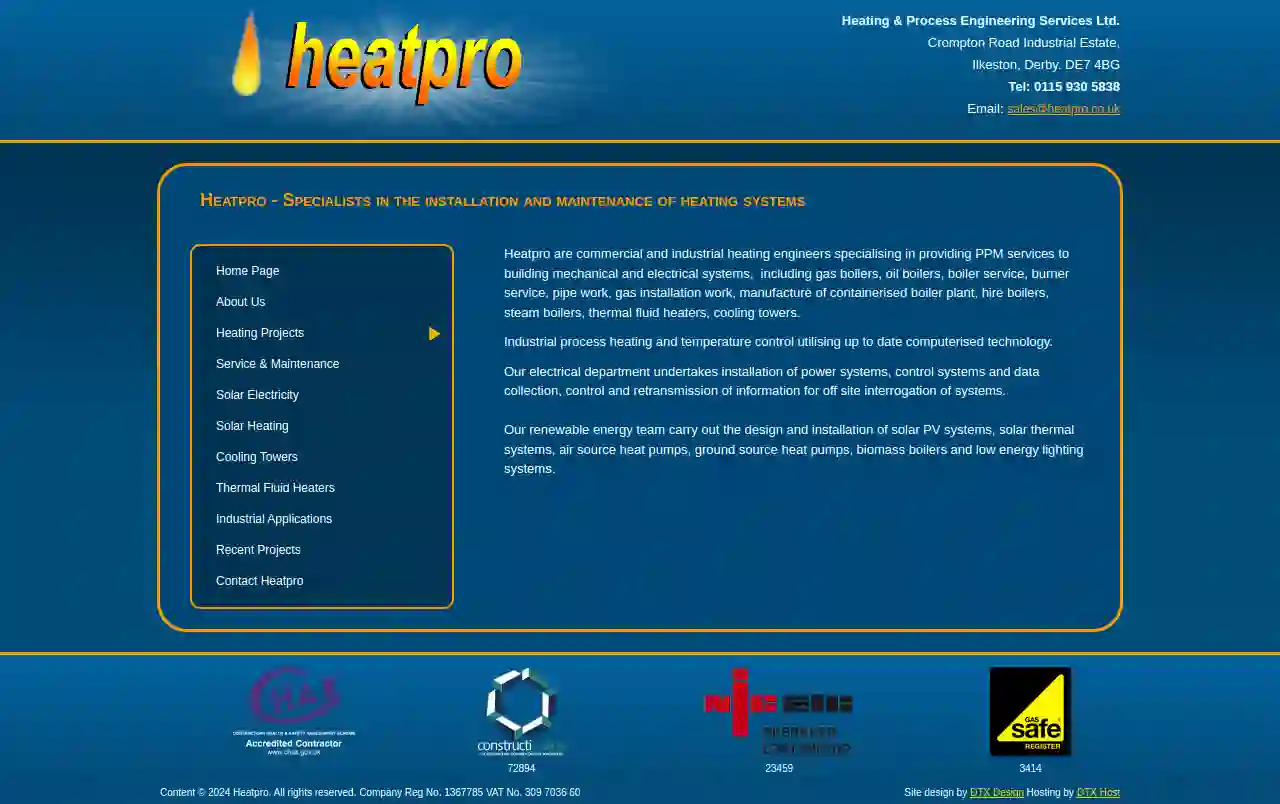
Heating & Process Engineering Services Ltd
44 reviewsIlkeston, Derby, Crompton Road Industrial Estate, DE7 4BG, GBHeating & Process Engineering Services Ltd. is a company that specialises in providing PPM services to building mechanical and electrical systems, including gas boilers, oil boilers, boiler service, burner service, pipe work, gas installation work, manufacture of containerised boiler plant, hire boilers, steam boilers, thermal fluid heaters, cooling towers. We also provide industrial process heating and temperature control utilising up to date computerised technology. Our electrical department undertakes installation of power systems, control systems and data collection, control and retransmission of information for off site interrogation of systems. Our renewable energy team carry out the design and installation of solar PV systems, solar thermal systems, air source heat pumps, ground source heat pumps, biomass boilers and low energy lighting systems.
- Services
- Why Us?
- Gallery
Get Quote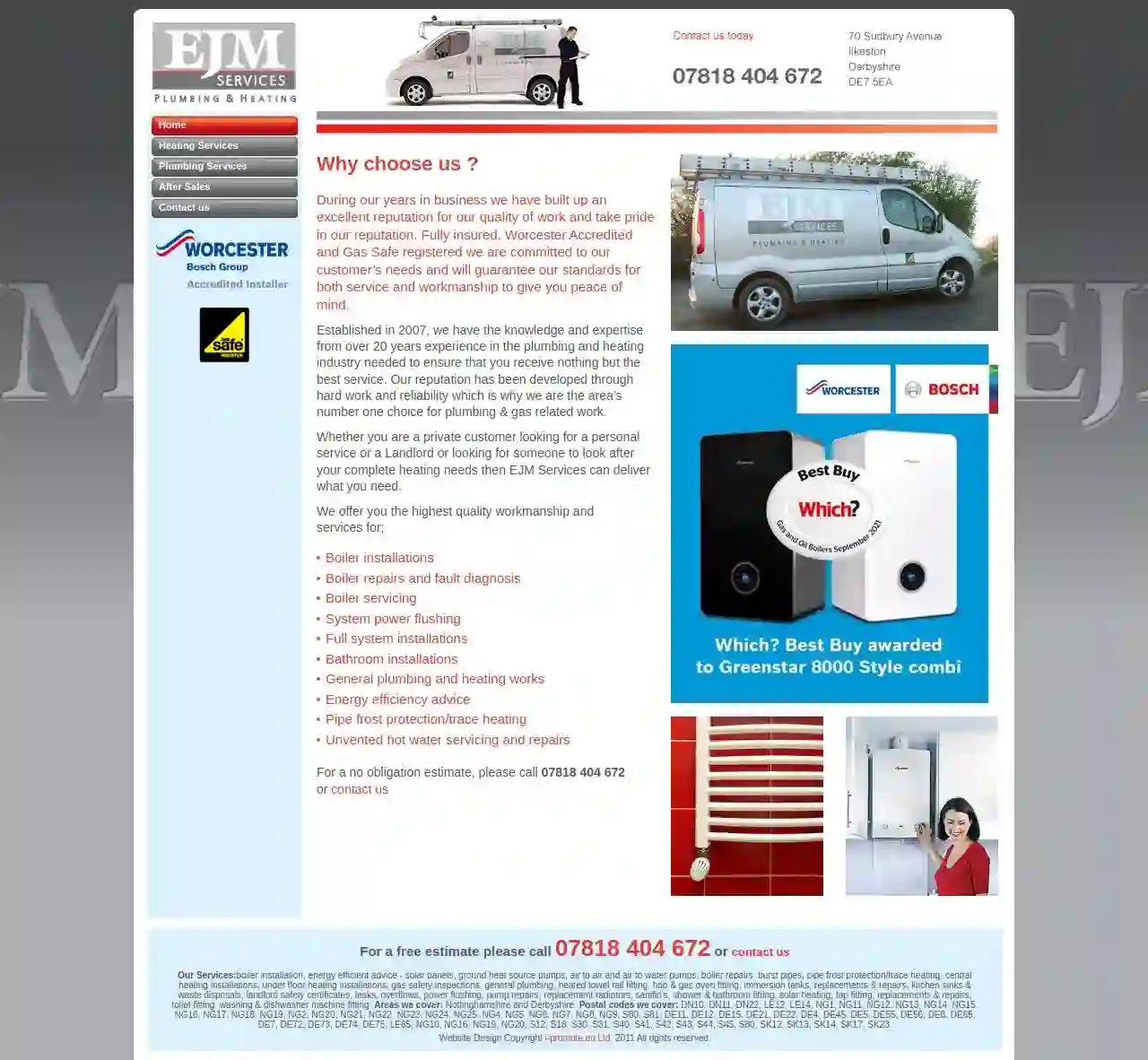
EJM Services
52 reviews70 Sudbury Avenue., Ilkeston, DE7 5EA, GBDuring our years in business we have built up an excellent reputation for our quality of work and take pride in our reputation. Fully insured, Worcester Accredited and Gas Safe registered we are committed to our customer’s needs and will guarantee our standards for both service and workmanship to give you peace of mind. Established in 2007, we have the knowledge and expertise from over 20 years experience in the plumbing and heating industry needed to ensure that you receive nothing but the best service. Our reputation has been developed through hard work and reliability which is why we are the area’s number one choice for plumbing & gas related work. Whether you are a private customer looking for a personal service or a Landlord or looking for someone to look after your complete heating needs then EJM Services can deliver what you need.
- Services
- Why Us?
- Accreditations
- Gallery
Get Quote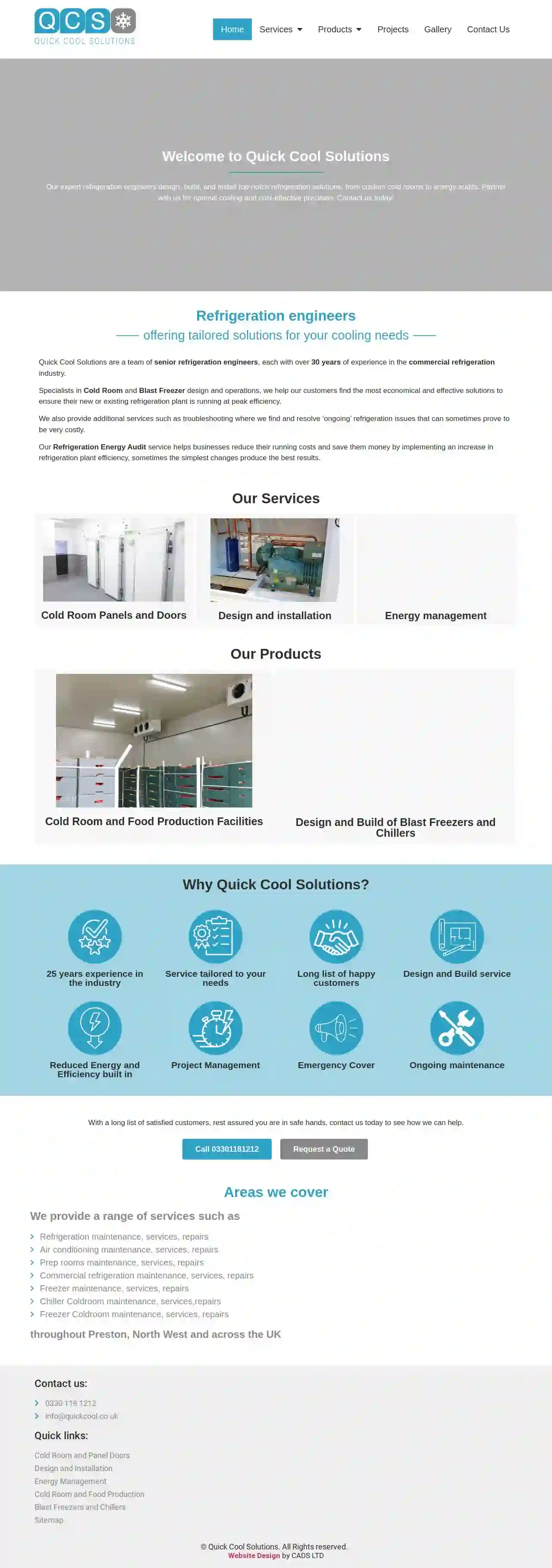
Quick Cool Solutions Ltd
Swadlincote, GBQuick Cool Solutions is a team of senior refrigeration engineers, each with over 30 years of experience in the commercial refrigeration industry. We are specialists in Cold Room and Blast Freezer design and operations, helping our customers find the most economical and effective solutions to ensure their new or existing refrigeration plant is running at peak efficiency. We also provide additional services such as troubleshooting where we find and resolve ‘ongoing’ refrigeration issues that can sometimes prove to be very costly. Our Refrigeration Energy Audit service helps businesses reduce their running costs and save them money by implementing an increase in refrigeration plant efficiency, sometimes the simplest changes produce the best results. With a long list of satisfied customers, rest assured you are in safe hands. Contact us today to see how we can help.
- Services
- Why Us?
- Gallery
Get Quote
Over 12,692+ HVAC Businesses onboarded
Our HVAC pros operate in Old Brampton and beyond!
HVACCompaniesHub has curated and vetted the Best HVAC Contractors in and around Old Brampton. Find a trustworthy pro today.
Frequently Asked Questions About Boiler Installation
- Your boiler is more than 15 years old: Older boilers are much less efficient than modern condensing boilers and are more likely to break down, so upgrading to a new, energy-efficient boiler could save you significant amounts on your energy bills over time.
- Your boiler keeps breaking down: If your boiler requires frequent repairs, it might be more cost-effective to replace it in the long run.
- Your energy bills are increasing: An inefficient boiler uses more energy resulting in costly increases to your heating bills. Consider replacing it with an energy-efficient model.
- Your boiler is making strange noises: Unusual banging, whistling, or gurgling sounds could indicate a problem with your boiler and should be investigated by a qualified heating engineer.
- Your radiators are not heating up properly: Radiators taking a long time to warm up, or some radiators not heating at all could indicate a problem with your boiler's circulation.
- Low water pressure: Low water pressure might mean your boiler is not functioning optimally. Have a heating engineer inspect the system.
- Leaks or drips near your boiler: If you notice water pooling around your boiler, it's important to get it checked by a professional immediately.
- Pilot light goes out frequently: A faulty pilot light is often a sign of bigger issues to come.
- Yellow flame instead of blue: A yellow flame could indicate the presence of carbon monoxide, which is a dangerous gas. . If you see a yellow flame, turn off the boiler and contact a qualified technician immediately..
How long does it take to install a boiler?
Can I install a boiler myself?
What is a condensing boiler?
What are the signs that I need a new boiler?
How long does it take to install a boiler?
Can I install a boiler myself?
What is a condensing boiler?
What are the signs that I need a new boiler?
- Your boiler is more than 15 years old: Consider replacing an older unit with a new, high-efficiency boiler.
- Your boiler keeps breaking down: If your boiler requires frequent repairs, it might be more cost-effective to replace it in the long run.
- Your energy bills are increasing: An inefficient boiler uses more energy resulting in costly increases to your heating bills. Consider replacing it with an energy-efficient model.
- Your boiler is making strange noises: Unusual banging, whistling, or gurgling sounds could indicate a problem with your boiler and should be investigated by a qualified heating engineer.
- Your radiators are not heating up properly: Radiators not getting hot evenly or consistently could indicate a boiler malfunction, air in the system, or circulation problems.
- Low water pressure: Low water pressure might mean your boiler is not functioning optimally. A qualified technician should investigate the problem. .
- Leaks or drips near your boiler: If you notice water pooling around your boiler, turn off your boiler and immediately contact a qualified heating engineer to assess and fix the issue.
- Pilot light goes out frequently: If you have an older boiler and the pilot light goes out frequently, it may need to be repaired or replaced. .
- Yellow flame instead of blue: A yellow flame on a gas boiler can mean there is incomplete combustion or a dangerous carbon monoxide leak. Seek immediate assistance from a qualified professional.